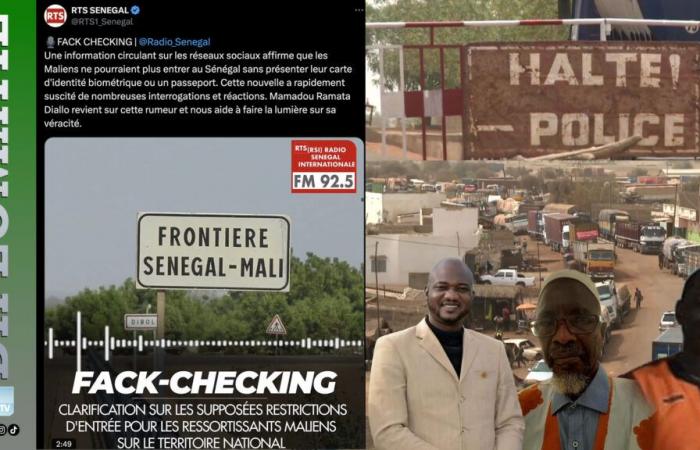This crucial information, when we know the importance of relations between our two countries, was followed by us with professionalism and seriousness, and our publications were all struck by the fact and its verification.
This is why we were stunned to see that RSI had taken the liberty of reproaching us for our work and above all had denied us the right to take an interest in this situation, even treating us as dangerous troublemakers capable of setting fire to Senegalese relations. -Malian. Just that!
Taking up without any precaution a press release from the Ministry of the Interior, Mamadou Ramata Diallo, in his program imprudently titled “FACK CHECKING”, instead of “FACT”, meaning “FACTS”, precisely, proved by this error that she did not know not what she was talking about, claimed to have to, according to her, “provide clarification on the supposed entry restrictions for Malian nationals on the national territory”.
A person who calls himself a journalist and who does not know that “off” in journalism refers to a term for informal discussions between journalists and political leaders, the content of which is not supposed to be reproduced” and which displays them all along her column of “FACK CHEKING”, as she says, is rather poorly placed to label us as “certain press”.
We present to RSI the content of our work, which does not suffer from any breach of the principles of journalistic work consisting of seeking, verifying and triangulating our information. So that Mamadou Ramata Diallo of RSI can learn from it, Dakaractu comes back for you on all the stages which have marked our permanent concern to keep our readers well informed, and above all with full responsibility and in full awareness of the acuteness of this subject.
Historical of notre work .
Dakaractu first acted as the conduit of this information, revealing that Malian nationals would henceforth have to be satisfied with one of two documents, in this case, the biometric card or the passport, to enter Senegal.
Indeed, in Senegal, Malians could enter with the NINA card, the passport or even the national biometric identification card. But they are now systematically rejected when reaching the Senegalese borders, because they do not have their biometric card or their passport.
We added that apparently the information was not held by most Malians. Pushing the questioning by asking us why these measures had not been widely communicated by the competent Senegalese authorities. We called the communications officer of the National Police, who then replied: “I am not saying that the information is false, but I have not yet received it” and then assured us to get back to us after verification.
Dakaractu then contacted by telephone in Bamako the person in charge of social affairs and migration issues at the executive secretariat of the High Council of Malians from abroad, Mamadou Lamine Bane, who informed us in precise words of the situation: “It is involves several convoys of passengers who were on public transport between Bamako and Dakar. Arriving at the border, during the passenger check, several of them were confronted with the refusal of the national card. classic Malian identity card (handwritten card or NINA card) The police at the Senegalese border at Kidira only accepted the new biometric card or passports. […]. Senegalese border police officers said that the measure was a general measure, an application of ECOWAS and UEMOA community rules on the biometric identity card which is the recognized identification tool. quote.
Adding that finally, there was this press release from the Senegalese police which suspended the measure and that currently, people passed normally with the NINA card, the biometric card and their passports.
Responding to our question on the possibility of talks between the authorities of the two countries, Mr. Bane then told us: “I think that a negotiation between the two governments could have taken place. In any case, I believe that the acceleration of the suspension can be understood as high-level talks between the highest authorities of the two countries. In any case, at the level of the High Council of Malians Abroad and the Diplomatic Mission, there was a mission planned to come to the border […] to request relief from the situation, but before the mission left, the announcement was made that the measure was suspended (). I think what may have speeded things up were the talks between the authorities of the two countries.”
Continuing scrupulously to do its work in the greatest journalistic orthodoxy, Dakaractu contacted Mr. Mohamed El Dicko, president of the National Youth Council of Mali/Senegal section, who during this interview with us returned to the contours of this decision which fizzled out.
“Indeed, there was a blockage in the use of certain travel documents (Nina and consular cards). We used to travel by land with the consular card, NINA identification card, biometric card or passport. Anyone who held these documents had easy access to Senegalese territory by land,” specifying that entry into Senegal by land with these last two documents had been prohibited for a week. »
We verified our information with the National Youth Council of Mali/Senegal Section and its president, who told us that he had contacted the highest authorities and had taken the decision to issue a press release to reassure their compatriots.
This press release n°051 from the CNJ-MALI/Senegal Section relating to the lifting of the measures taken by the Senegalese authorities explains that the general secretariat of the National Youth Council of Mali/Senegal Section informs national and international opinion that following the negotiations with stakeholders, all travel documents from Mali are authorized to passengers who wish to come to Senegal, namely the consular card, the Nina card and the biometric card and passport were valid.
Adding: “We salute the diligence of our highest authorities without forgetting the common sense of the authorities of the host country which is Senegal.”
Mamadou Ramata Diallo, Dakaractu spares you the other contacts that we had to question, such as the editor-in-chief of the radio “StudioTamani”, as many people that your supposed professionalism should have pushed you to meet and question instead of asking us to us, to provide you with their contacts to do your “FACT CHECKING” that is how it is written, so that in the future you do not misuse this journalistic genre that our country needs so much to see the development of a country which renews strong links with information and those who inform them, outside any partisan or state chapel.
Mamadou Ramata Diallo from RSI, we tell you this without any rancor, but with complete freedom and responsibility.
Fack-check well! ! !






